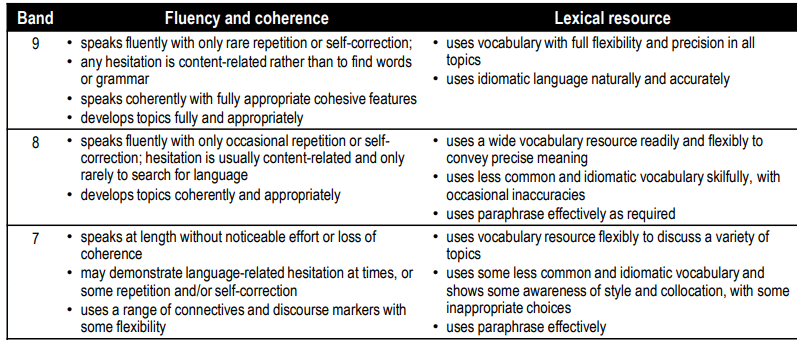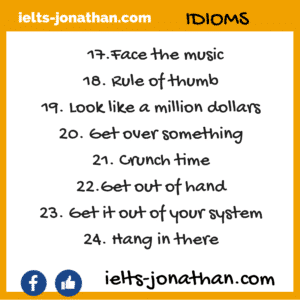Using Idioms in the IELTS Speaking Test
One of the things that separate native English speakers from those learning the language is the correct use of idioms.
In the IELTS speaking test they can really help boost your score, if used properly.
However, they can also lower your score, if you don’t use them correctly.
What are idioms?
An idiom is a group of words or phrase that through shared, common usage has meaning that is not clear from simply the words themselves.
For example, ‘It’s raining cats and dogs’ means that it’s raining heavily, but if we look at the words, and not the meaning, it seems like dogs and cats are falling from the sky.
Confused? Let’s look at another example.
- If someone is ‘High as a kite’, it doesn’t actually mean they are flying, it means that experiencing some kind of euphoria.
- Example; He met her recently, and since then “he’s been high as a kite”, it must be love!
- Example; Congratulations on the job promotion, you “must be high as a kite!”
To really understand what idioms mean we have to understand two words – both literal and metaphorical.
Literal means the normal or usual meaning of a word.
Metaphorical describes words that are used as symbols for something else.
It is the opposite of literal.
So ‘high’ literally means located above the earth’s surface, but metaphorically means something has happened to provide the experience of happiness and we are feeling the effects.
Therefore, it is impossible to understand the meaning of idioms by just looking at the words. You have to find out what the metaphor actually means, and use the context.
If you consider your own language, I’m sure you can think of a few idioms you often use.
Should I use them in the writing or speaking test?
Idioms are used informally most of the time and should therefore not be used in the writing test, unless you are writing an informal letter for the General Paper, but even then you still need to be careful.
Spoken English is normally much less formal than academic written English, so it is fine to use idioms in the speaking test.
Band Descriptors
How can they increase my score?
The picture above shows part of the band descriptors for speaking.
The 3 bands above are 7, 8 and 9.
As you can see, using idioms, even with some inappropriate choices, is typical of a band 7 candidate.
By using them skillfully though, with only occasional inaccuracies, you are likely to get an 8 in this category.
Rarely do students use them perfectly and if they do, then this is typical of someone who reaches a Band Score 9.
Should I just memorise lots of them?
Absolutely not!
This is one of the most common mistakes in the IELTS speaking test.
Lots of students think that simply learning lots of idioms and then using them in the test will help them get a high score.
In fact, the opposite is true. Examiners are trained to recognise people trying to use idioms that are inappropriate.
idioms often depend on the context and if you don’t use them correctly, they will sound very forced and unnatural. The examiner will spot this.
How do I use them effectively?
You should only use idioms if you have heard how they are used in context and you are 100% sure you are using them in the correct way.
This may sound tough, but it is better than losing marks.
Common Idioms
Below are some common idioms that I have heard students use correctly in the IELTS speaking test.
If you have never heard any of them before, try to find more examples of how they are used and then practice using them when you are practicing speaking.
Also, understanding where they originate from can help you remember them.
If you can, have a native speaker or English teacher listen to you and tell you if you are using them correctly.
Most of these are ways to describe something, someone or how you feel.
These tend to be easier to use because you can substitute the description you would normally use for the idiom.
Here’s two examples
Costs an arm and a leg– really expensive.
Those shoes must have cost an arm and a leg.
Sit on the fence– to be undecided.
I haven’t made my mind up about that issue, I’ll have to sit on the fence.
Remember, don’t just use idioms because you think they will increase your Band Score. Not used well, they might reduce it.
Learn a few basic idioms, like the ones above, and understand the meaning and usage. You can use YouTube, there are lots of videos about idioms.
If you’re lucky, you might get a chance to use one or two in the Speaking Test.
I’m Jonathan
I’ve taught IELTS and University English in more than a dozen universities and schools around the world.
I’m a parent, traveller and passionate about language teaching and helping students achieve their dreams.
Whilst living in Austria or working in Asia, I run IELTS courses to help students get to where they want to be.
If you are serious about IELTS, connect with me to see how I can help you.











Was this helpful? Leave a comment :)